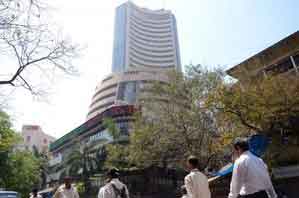Domestic financial conditions in India are in the comfort zone despite foreign portfolio investor (FPI) outflows, according to a Crisil report on Friday.
After record-high FPI inflows in September, October logged the highest post-pandemic outflows.
“Yet, this did not significantly drag India’s financial conditions,” showed Crisil’s Financial Conditions Index (FCI).
The FCI -- which is a combination of parameters from India’s major market segments along with policy and lending conditions – moderated to 0.1 in October compared with 1.2 in the previous month.
“However, the FCI value remained positive, implying easier conditions than the long-term average,” the report mentioned.
FPI outflows primarily hit the equity markets. The pressure on domestic interest rates was limited, as it was offset by easier domestic monetary conditions.
Additionally, stable crude prices supported the Indian financial markets. The rupee depreciated at a moderate pace during the month
“That said, the lagged impact of the RBI’s past rate hikes is gradually being felt in the broader economy. Bank credit growth has been slowing in the past three months, including for personal loans. This is likely to impact consumption, especially in urban areas,” the report mentioned.
Short-term capital flows to India from FPIs have been highly volatile.
The RBI changed its stance to ‘neutral’ in October, while systemic liquidity conditions improved. Additionally, stable crude prices supported the Indian financial markets. The rupee depreciated at a moderate pace during the month.
“The RBI may like to get clarity on how these risks will play out, before going in for a rate cut. Overall, we expect one rate cut by the RBI this fiscal,” said the report.
FPIs turned net sellers in October, withdrawing $11.5 billion (in equity, debt and hybrid categories) compared to an inflow of $11.2 billion in September.
The equity market saw a record-high net outflow of $11.2 billion (vs an inflow of $6.9 billion in the previous month) in response to the rise in Chinese equities following the announcement of aggressive fiscal stimulus measures.








IndusInd Bank CEO Kathpalia quits due to derivatives accounting lapse
IndusInd Bank announced on Tuesday that its Managing Director and CEO Sumant Kathpalia has resigned from his post in connections with the derivatives accounting lapse that has eroded the private sector bank's net worth.
Sensex closes in green during volatile trade, Nifty ends at 24,336
Sensex opened on a positive note of almost 180 points at 80,396 and surged to an intra-day high of 80,661. However, the index quickly erased its gains, dipping into the negative zone and reaching a low of 80,122, which was 539 points down from its highest point of the day.
Indian stock market rebounds with strong gains, Sensex jumps 1,006 points
The Indian stock market bounced back strongly on Monday despite geo-political tensions, with the benchmark indices ending the day on a robust note.
India-Pakistan tensions: History shows Sensex bounced back stronger after every conflict
Even as tensions between India and Pakistan rise once again following the barbaric Pahalgam terror attack, Indian stock markets have showcased resilience every time the two neighbouring nations went into conflict.
Indian stock market opens higher, Sensex above 80,000
The Indian equity benchmark indices opened higher on Friday amid positive global cues, as buying was seen in the IT, pharma and auto sectors in the early trade.
Adani’s cement major ACC clocks highest-ever annual PAT at Rs 2,402 crore in FY25
Leading cement and building materials company ACC Limited on Thursday reported highest-ever annual profit after tax (PAT) at Rs 2,402 crore in FY25, up by 3 per cent.
Sensex, Nifty extend winning streak for sixth day, rise nearly 8 pc in 6 sessions
The Indian stock market continued its upward journey for the sixth straight trading session on Tuesday, supported by gains in fast-moving consumer goods (FMCG) and private banking stocks.